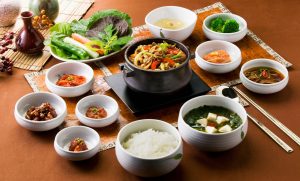During one of the first quiz sections we discussed the question, how has nutritionism impacted the way you eat? To put it shortly, it hasn’t had any real effect on the way I eat. My parents emigrated to the U.S. from South Korea before I was born, thus, I grew up eating traditional Korean meals. Luckily, there was a large enough Asian community here in Washington so they could find the ingredients necessary to sustain our traditional eating habits. Going through the American school system I did learn about nutrients and what not in health classes, but it never really factored into my personal life as I wasn’t the one cooking or buying groceries.

Photo: Topic Images Inc./Getty Images
Coming to college, you would imagine that my degree of caring about nutrition would increase as now I am in a situation where I need to cook and buy groceries for myself, but that wasn’t/isn’t the case. The reason is that, since I grew up in a situation where nutrients and nutritional values weren’t expressly discussed/emphasized, I came to recognize whole foods as being healthy (or unhealthy) rather than looking and judging by the nutrition information provided.
Furthermore, after learning about nutrition (prior to this class) my position on the field has been that it is really just a guideline to use as reference if I wanted to change my eating habits not something to build my eating habits off of. This position has been reinforced even more after reading Michael Pollen’s, In Defense of Food, as he severely critiques the nutrition field throughout the book.
In a broader context, I certainly think that what nutritionism sets out to do is important. However, I strongly believe that emphasizing singular nutrients, with minimal understanding of the whole food, is not the way to achieve what nutritionism sets out to accomplish.

Sungkun, it is very interesting to hear about the impacts of nutritionism (or lack thereof) from someone who’s diet is constructed of cultural foods. My family is ethnically Eastern European, but we lost our ties to that heritage generations ago. At this point, the only culture my family would identify with is being American. I found this idea especially intriguing in Michael Pollan’s book In Defense of Food. Pollan said that history has changed cultural diets to allow for the complete nutrition of those who eat them. If you look at traditional diets from around the world, while they are all different, the people who have access to those foods are all well nourished. Pollan’s point is that it is the absence of these cultural diets that have bred nutritionism to it’s current state. The meals my mom would make when I was younger were all based upon the nutritional content of the individual parts. She would pick low-fat meats and processed starches with added vitamins and minerals to benefit us the most. We did not have a culture to teach us how to eat so we prescribed to the prevalent nutritionism narrative. I agree with you that nutritionism is not the best way to eat because foods are living systems and cannot be broken down into their individual parts. That being said, nutritionism is the only diet I have ever known. Even as I am aware of the short comings of this way of eating, I find it challenging to move away from this diet without a replacement.
Adding on to what you both have said already, the impact of culture and upbringing is huge when it comes to food and diets. Because like you said, you grew up with your parents cooking a certain way and picking certain ingredients, and that’s how you learn to feed yourself.
I think sometimes you get into these interesting situations where you’ve been raised a certain way, but modern industry wants you to believe something different – your foods are wrong, you should eat these foods instead because they have certain nutrients. And that affects people differently.
I agree with you that it would be good if we really did understand food at a scientific level, which is what nutritionism wants to do. But there is a danger when we draw conclusions about health from areas we don’t fully understand, and there are plenty of historical examples of that.